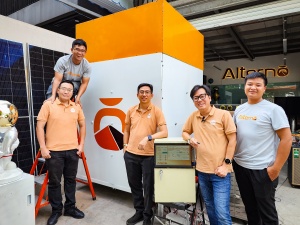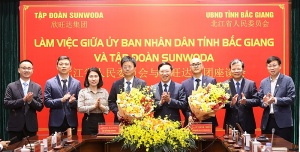Embracing battery energy storage systems to power Vietnam’s green growth
The US Department of Commerce’s International Trade Association estimates a 10 per cent annual growth in Vietnam’s power demand between 2021 and 2024. Additionally, during the September 2023 technical working group meeting organised by the Vietnam Energy Partnership Group, Vietnam’s National Load Centre highlighted a concerning inconsistency in the current development of power generation and demand growth.
 |
| Sunita Dubey, country delivery lead in Vietnam Global Energy Alliance for People and Planet |
Considering the extreme weather conditions and urgency of climate action, the variability of renewables could become a roadblock in the country’s drive to meet this demand and ensure energy security. Effective demand management and maintaining the momentum of renewable energy deployment necessitates the integration of innovative technologies such as battery energy storage systems (BESS) into Vietnam’s developmental and energy resilience strategies.
To address this growing demand while advancing climate goals, Vietnam is turning to innovative solutions like BESS. The country stands at a crucial juncture in its energy trajectory, with a substantial installed capacity of renewable energy and ambitious plans for further expansion. The visionary targets for renewable energy deployment outlined by Vietnam’s Power Development Plan VIII (PDP8) align with the nation’s global commitments to combat climate change.
Key multinational corporations such as Apple, Microsoft, Samsung, Nike, PepsiCo, Procter and Gamble, Nestlé, and Unilever have also pledged to transition to 100 per cent renewable energy, indicating a growing demand for clean power sources in Vietnam.
Spearheading the implementation of the country’s first grid-connected BESS pilot, we collaborated with the US Agency for International Development, the Asian Development Bank, and the Rocky Mountain Institute. This collaboration aims to ensure that BESS is included in the PDP8 and extends swift and strategic technical assistance to the government’s Institute of Energy.
Bringing together the expertise and resources of alliance partners, we have coordinated a plan to embed and expand a pilot BESS project, creating a growth roadmap for 300MW, and devising a regulatory framework.
Integrating BESS into Vietnam’s energy infrastructure demonstrates promising prospects for facilitating the nation’s energy transition. By storing excess energy during periods of low demand and releasing it during peak times, BESS can enhance grid flexibility, reduce emissions, and lower electricity costs.
In addition to the positive impact on the environment and the grid, BESS integration brings significant economic benefits, such as lower electricity costs, employment opportunities, and substantial investments. However, to fully realise these benefits, Vietnam must implement supportive policies and regulations to accelerate the deployment of BESS.
Despite the potential of BESS, several challenges hinder widespread adoption. High upfront costs, limited financing options, and a lack of technical expertise create barriers for investors and developers. The existing regulatory framework must be reformed, and grid infrastructure optimised for integrating large-scale storage systems.
Further, clear policies on energy trading need to be introduced to eliminate uncertainties. While Vietnam has taken initial steps by including a 300MW BESS target in the PDP8, more ambitious action is needed.
The declining cost of lithium battery cells, coupled with technological advancements, has made BESS increasingly affordable and accessible, according to Contemporary Amperex Technology, the world’s largest battery manufacturer. Vietnam should capitalise on this trend to attract investment, create green jobs, and enhance energy security.
The proactive integration of BESS alongside renewable energy generation by countries such as Indonesia, the Philippines, Mongolia, and India offers a replicable model and valuable insights to expedite the country’s energy transition.
By harnessing renewable energy for manufacturing processes, Vietnam can produce sustainable products while bolstering its economic competitiveness on the global stage. The country’s ambitious plans, supported by international collaborations and leading corporations, reflect a commitment to innovation.
As Vietnam charts its path towards energy security and sustainability, the integration of BESS emerges as a critical enabler of this transition. By embracing BESS, Vietnam has the potential to lead the way in clean energy innovation, fuelling economic growth while safeguarding the planet for future generations. Embracing the promise of battery storage will usher in a new era of prosperity and sustainability for Vietnam and beyond.
 | Vietnam's sand battery startup Alternō secures $1.5 million to cut carbon emissions in agriculture In a significant leap forward for agricultural climate solutions, Alternō on April 2 announced that it has successfully secured over $1.5 million in an oversubscribed round co-led by leading impact and VC funds The Radical Fund (Singapore) and Touchstone Partners (Vietnam). |
 | Chinese battery manufacturer Sunwoda to pour $300 million into Bac Giang Chinese battery manufacturer Sunwoda plans to make an additional $300 million investment in the northern province of Bac Giang. |
What the stars mean:
★ Poor ★ ★ Promising ★★★ Good ★★★★ Very good ★★★★★ Exceptional
Related Contents
Latest News
More News
- $100 million initiative launched to protect forests and boost rural incomes (January 30, 2026 | 15:18)
- Trung Nam-Sideros River consortium wins bid for LNG venture (January 30, 2026 | 11:16)
- Vietnam moves towards market-based fuel management with E10 rollout (January 30, 2026 | 11:10)
- Envision Energy, REE Group partner on 128MW wind projects (January 30, 2026 | 10:58)
- Vingroup consults on carbon credits for electric vehicle charging network (January 28, 2026 | 11:04)
- Bac Ai Pumped Storage Hydropower Plant to enter peak construction phase (January 27, 2026 | 08:00)
- ASEAN could scale up sustainable aviation fuel by 2050 (January 24, 2026 | 10:19)
- 64,000 hectares of sea allocated for offshore wind surveys (January 22, 2026 | 20:23)
- EVN secures financing for Quang Trach II LNG power plant (January 17, 2026 | 15:55)
- PC1 teams up with DENZAI on regional wind projects (January 16, 2026 | 21:18)

 Tag:
Tag:




















 Mobile Version
Mobile Version